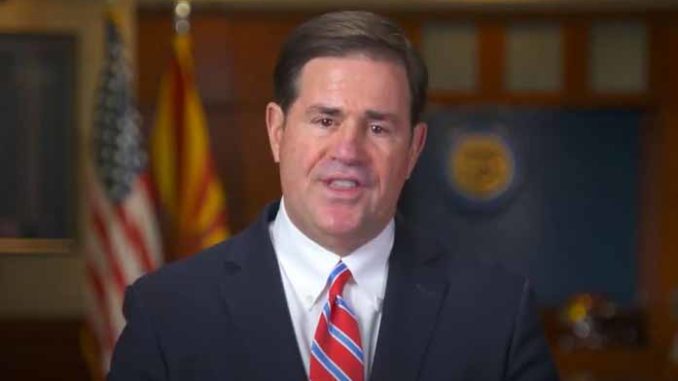
PHOENIX — On Monday, in his State of the State address, Governor Doug Ducey called for a return of students and teachers to the classroom. Ducey said it was time to get students “back where they belong.”
The governor argued that the COVID-19 pandemic has taken a toll on Arizona’s students and their education as school districts across the state refuse to allow children to return to their classrooms.
“It’s time to get our students back where they belong, said Ducey. “With every public-health professional, from Dr. Fauci and the CDC on down, saying that the safest place for kids to be is in school, we will not be funding empty seats or allowing schools to remain in a perpetual state of closure. Children still need to learn, even in a pandemic.”
Parents have been urging politicians to come up with solutions that increase parental choice, which has been all but eliminated by the pandemic.
“By necessity during this emergency, many parents have been more engaged than ever in the daily education of their children,” continued the governor. “Quite a few have found temporary educational options they want to make permanent. It’s their right. Public policy should keep pace and empower them to make that choice.”
“There’s been severe learning loss. Kids have missed out on so much,” said Ducey, who then called for an increased allocation to low-income schools. “Let’s put our resources on getting them caught up. Before COVID, we had an achievement gap in our schools. And it’s only gotten worse. It’s a problem detailed in a report just last week from one of the state’s leading business organizations – with data showing the gap in student achievement often falls squarely down economic and racial lines.”
“Distance learning has not been good for these students, who often don’t have wi-fi or a laptop available. So, starting now, let’s direct resources to helping these children catch up. Summer school, longer school days, one-on-one targeted instruction, tutoring. It should be our goal that every student graduates high school on time and at grade level.”
Hoffman Pushes Back
Superintendent of Public Instruction Kathy Hoffman immediately pushed back against the governor. Since the start of the pandemic, she has dismissed the pleas from mostly low-come working parents, who have been disproportionally harmed economically by school closures.
My response to the #StateOfTheState: pic.twitter.com/cMdlRffOLt
— Kathy Hoffman (@Supt_Hoffman) January 11, 2021
Contrary to Hoffman’s claims, students have been denied both virtual and in-person learning on occasion. In fact, at the same time Ducey was delivering his speech, some students in the Peoria Unified School District were locked out of traditional and virtual classrooms due to a district-wide “sickout” by members of the Peoria teachers’ union.
Unintended Consequences Of Good Intentions
Ducey took a swipe at the media and those who have fought for closed schools and a stricter shut down.
“In my fifty-plus meetings with the press,” said Ducey, “I’ve heard endless variations of the same question: Why not more and longer lockdowns? Why not more aggressive lockdowns? Schools, businesses, parks, weddings, funerals, church services – why not ban all gatherings and just lock everything down?”
“It’s a question that only makes sense if you forget about everything else – all the other troubles that lockdowns set in motion. The rest of life doesn’t stop in a pandemic, least of all our basic responsibilities,” explained the governor. “People still have bills to pay, children in need of schooling, businesses to run and employees who depend on them. There are lots of men and women who don’t have the option of remote work and don’t receive uninterrupted direct deposits. To make a living, they have to show up somewhere. And if the doors are closed, then at a certain point they are never going to open again.
“If we’re really all in this together, then we have to appreciate that for many families “lockdown” doesn’t spell inconvenience; it spells catastrophe… zero income, inability to make a payment, eviction, foreclosure, and real personal anguish,” continued Ducey.
Ducey concluded that the “extreme measures by well-intentioned people have unintended consequences that actually do far more harm than good.”
